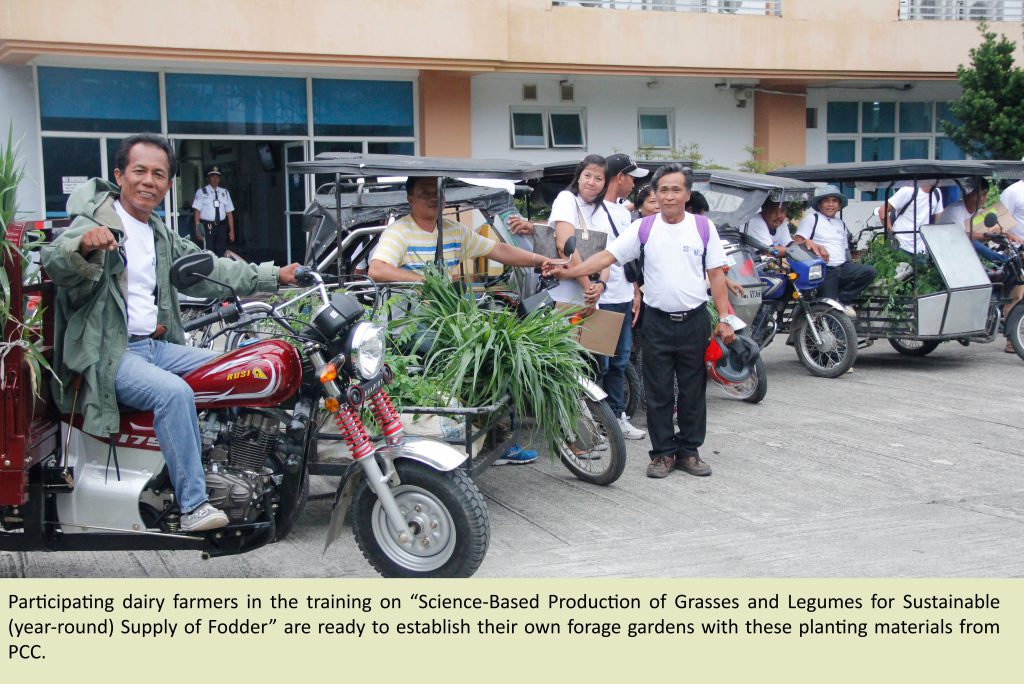Thirty dairy farmers gained additional knowledge on the backyard production of forages to support the nutritional requirement of their buffaloes thru a two-day farmers’ training on “Science-Based Production of Grasses and Legumes for Sustainable (year-round) Supply of Fodder” last October 10-11 at the PCC national headquarters, Science City of Muñoz in Nueva Ecija.
Said training is in line with the project 1 component of the Philippine Council for Agriculture, Aquatic and Natural Resources Research and Development (PCAARRD) titled, “Development of Feeding Protocols and Practices to Support the Nutritional Requirements of Dairy Buffaloes”.
The project, which was funded by PCAARRD and implemented by PCC, aimed to address the issue on feed scarcity by providing assistance in the form of technical and practical trainings to dairy buffalo farmers in order to help them plan out and implement a sustainable homegrown grasses and legumes plantation.
“Forage supply for feeding buffaloes is one of the major problems that affect the success of the dairy farmers especially their income,” Dr. Daniel Aquino, project leader and center director of PCC at CLSU, said.
“Majority of farmers at the national impact zone practice different feeding systems depending on the number of their buffaloes. Whereas, those who have more than five dairy buffaloes are becoming aware of the importance of good nutrition, thus, they adopt forage production by establishing a forage garden using improved grasses.” Dr. Aquino added.
According to him, with the introduction of Super Napier varieties Molato and Mombasa including some improved legume species, the dairy farmers are now encouraged to establish a forage garden in their respective areas.
PCC acting executive director Dr. Arnel Del Barrio, on the other hand, shared the efforts and interventions of PCC in addressing the problem of dairy farmers in marketing and distribution of milk. He said marketing also plays a vital role in persuading farmers to practice proper feeding management.
“The key to health improvement among dairy buffaloes is in the hands of caretakers like you,” Dr. Del Barrio told the dairy farmers.
“With good feeding, management, and breeding, you are sure to boost your animals’ milk production. You just focus on the production and we, at PCC, are doing interventions such as the institutionalization of milk feeding program and establishment of products’ outlets. When you have a ready market, you will definitely find feed resources for your buffaloes to maintain their good body condition and milk yield,” he emphasized.
He added that in 2017 PCC will take on a new role to monitor the feeding systems of dairy farmers. Key personnel of PCC dedicated for this purpose, he said, will conduct an actual visit to the farms of dairy farmers and provide suggestions to improve their feeding systems.
“We are targeting 50 farmers to be visited next year to help them with their animal nutrition problem. It will be consultative. We will approach you to hear your concerns then we will agree on solutions,” he said.
The training involved farmers from the different cities and municipalities in Nueva Ecija. The selection of the participants was based on their current number of animals, interest and commitment to participate, readiness to utilize available resources including their forage area for the implementation of the project and promptness to gather record and share relevant data that will be generated from the project.
The two-day training comprised of lectures, workshop on calculation of annual forage requirement and area to be established, and actual demonstration on land preparation and the proper way of planting grasses and legumes.
After the training, the participants were also given planting materials to start establishing their forage areas. The volume of planting materials provided to them was based on the area required to support the year-round forage requirement of the number of animals they raise or maintain.
The second batch of the two-day farmers’ training involving another 30 farmers is set to be conducted in November.

